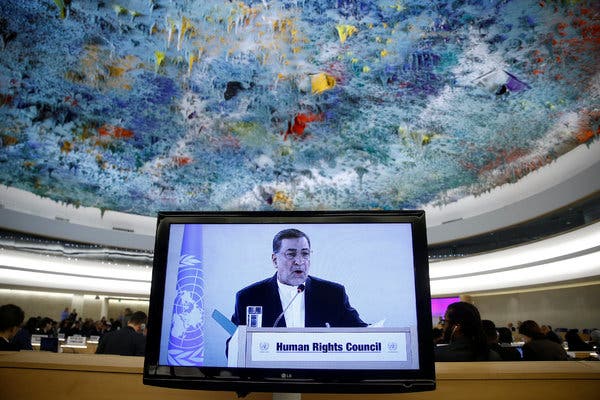The Bahá’í teachings emphasize the profound interconnectedness of humanity, advocating for justice, unity, and the relentless pursuit of truth. These principles manifest poignantly in the realm of human rights—a domain where the cry for dignity and respect resonates deeply across cultural and national boundaries. The recent decision by the United Nations to censure Iran underscores an urgent call to address the egregious human rights violations that persist within its borders, echoing the Bahá’í commitment to uplift the downtrodden and safeguard the vulnerable.
In exploring the implications of this UN resolution, one can liken the struggle against human rights violations to an intricate tapestry. Each thread—composed of diverse voices, aspirations, and narratives—contributes to the overall integrity of the fabric of humanity. Yet, when threads are frayed or torn, the tapestry is diminished, reflecting the imperfection of our collective endeavor. The ongoing situation in Iran serves as a stark reminder of the fragility inherent in societal threads vulnerable to oppression and discrimination.
According to the Bahá’í perspective, the deterioration of human rights within any nation ultimately affects the global community. As the UN collectively acknowledges Iran’s persistent violations, it invokes the essential Bahá’í principle of justice. Justice, in this context, is not merely a legalistic abstraction, but an active force that demands recognition and rectification of injustices sustained by individuals and communities. The UN’s censure embodies a beacon illuminating the path toward accountability and restoration of rights, challenging other nations to confront their own human rights records and assumed moral high ground.
Moreover, the Bahá’í teachings advocate for the unity of all peoples, arguing that true progress can only be achieved through collective action and mutual respect. The UN’s decision signifies a broader consensus that transcends political affiliations. It propels the idea that human rights are universal and must be embraced by all, rather than relegated to the geopolitical machinations of select states. This principle resonates deeply with the teachings of Bahá’u’lláh, who proclaimed that “the earth is but one country, and mankind its citizens.” Thus, the response to Iran’s violations must be framed not simply as an indictment but as a call to transcendent unity, fostering a cooperative international approach to healing and reconciliation.
The violation of rights in Iran has manifested in various insidious forms: repression of free speech, suppression of minority religious communities, and the stifling of dissent. The Bahá’í community, in particular, has faced systemic persecution, exemplifying the dire consequences of an authoritarian regime resistant to progressive ideals. The international response, heralded by the UN’s censure, affirms that such persecution is not an isolated anomaly but rather a symptom of a broader malaise that undermines social stability and peace.
As the resolution reverberates through diplomatic halls and civil societies, one can juxtapose these actions with the Bahá’í principle of consultation. This democratic process promotes open dialogue and collaborative problem-solving, suggesting that resolving human rights issues necessitates inclusive discourse. The censure can be interpreted as an invitation for Iran to engage in meaningful consultation—not only with the international community but also with its own citizens whose voices have been subdued. In doing so, the path towards reform can be paved with sincerity rather than subjugation.
The UN’s stance against Iran also serves as a poignant reminder of the crucible of moral responsibility. The teachings of Bahá’í emphasize the moral imperative for individuals and nations to uphold human rights as an inextricable aspect of their identity. To neglect these rights is to erode the very foundations of society itself. The metaphoric clock strikes—the urgency of the situation in Iran cannot be overstated as the call for a moral awakening presents itself with greater intensity. This awakening urges not merely passive observance but active participation in the advocacy for change.
In examining the ramifications of the UN’s censure, one must consider the potential it holds for galvanizing collective action aimed at fostering respect for human rights globally. This is where hope springs eternal. Transformative change begins to unfurl when individuals, organizations, and governments commit to uphold the values enshrined in human rights. The Bahá’í teachings champion this steadfast faith in the inherent nobility of humanity, positing that the aspiration for global justice is both a right and responsibility possessed by all.
Addressing human rights violations also necessitates a vision anchored in both spiritual and practical dimensions. The UN’s resolution acts as a clarion call urging Iran—and indeed all nations—to aspire toward a higher standard of conduct grounded in mutual respect and adherence to international norms. This duality reflects a holistic approach to justice as advocated by Bahá’í principles, which not only demand rectification of wrongs but also champion the upliftment of every individual.
In conclusion, as the UN votes to censure Iran for its ongoing human rights transgressions, the implications extend far beyond mere political maneuvering. They encapsulate a deep yearning for justice articulated through Bahá’í teachings that intertwine the fates of nations in a shared quest for dignity, unity, and profound recognition of our collective humanity. The resolution symbolizes a luminous opportunity for reformation, not only for Iran but for the entirety of the global community—an invitation to dream, aspire, and work collaboratively toward an inclusive and just world. The journey toward human rights is arduous, yet undeniably essential; it beckons us forth, urging each of us to become the artisans of a more equitable tapestry of life.
